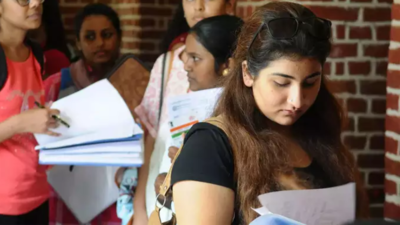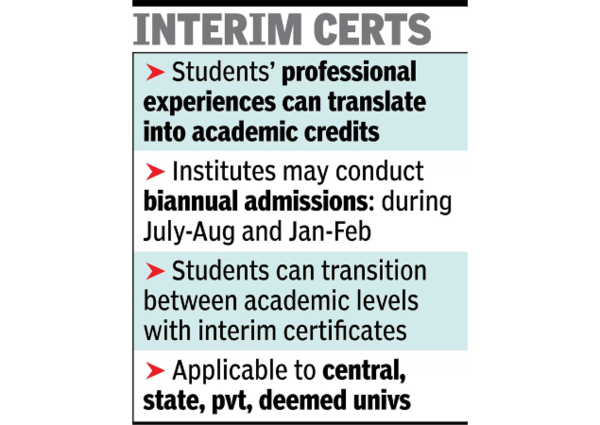NEW DELHI: Students from any stream in Class 12 can now pursue an UG programme of their choice, and UG students can join any PG discipline, provided they clear a national- or university-level entrance exam, such as CUET, according to a draft of new UGC regulations aiming to bring sweeping reforms in India’s higher education.
UGC also proposes to offer biannual admissions, flexibility in minimum credit requirements to obtain a degree, and
interdisciplinary learning
opportunities through an option of pursuing two programmes simultaneously.
The draft UGC regulations released Thursday for feedback and suggestions will be applicable to central, state, private and deemed universities. The regulations aim at dismantling “traditional disciplinary rigidities” by allowing students to choose programmes outside their prior streams, provided they meet the entrance exam requirements.
“Irrespective of the disciplines taken by a student in level 4/Class XII schooling, a student is eligible for admission in any discipline of UG programme, if the student qualifies national-level or university-level entrance examination in the discipline of UG programme,” according to the regulations.
UGC chairperson M Jagadesh Kumar said, “The draft UGC regulations, 2024, aim at transforming higher education by promoting flexibility, inclusivity, and adaptability. By removing rigid disciplinary boundaries, students can now explore diverse learning opportunities, ensuring India’s education system evolves to global standards.” The latest framework also encourages mobility between vocational and general education, and
recognition of prior learning
— whereby students’ professional experiences can translate into academic credits. Under these regulations, higher education institutions (HEIs) are authorised to conduct admissions twice a year — during July/Aug, and Jan/Feb.
The draft further introduces options for multiple entry and exit points, allowing students to transition between academic levels with interim certifications such as diplomas or degrees, depending on their earned credits. Minimum 50% of total credits must be earned in the student’s chosen core subject to obtain a degree, while the remaining can be accumulated through multidisciplinary or skill-based courses.
The reforms also redefine attendance norms, allowing HEIs to tailor minimum requirements based on the programme structure, in alignment with National Education Policy (NEP) 2020. The focus on continuous formative assessment and flexibility in curriculum content reflects a commitment to fostering holistic and multidisciplinary education, UGC said.
The regulations also have provisions for three or four year duration for UG degrees, with optional extensions under the extended degree programme or acceleration via accelerated degree programme. For PG, a two-year programme is standard, though graduates from four-year UG courses may qualify for a one-year Master’s programme. The regulations advocate for integration of skilling, internships, and apprenticeships into UG and PG curricula.



